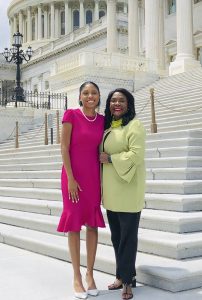Senior human resources, political science major spent summer on Capitol Hill
By David Miller

Alexus Cumbie was ecstatic when she learned that she was as one of 50 college students selected for an internship with the Congressional Black Caucus Foundation in Washington, D.C.
There, she’d be working for U.S. Rep. Terri Sewell, with whom she’d interned previously. She’d get to spend the summer on Capitol Hill and attend all of Sewell’s committee meetings and hearings, as well as interact with other legislators and change-makers, like the Obama Foundation. The experience would be invaluable for Cumbie, a UA senior with plans of attending law school or pursuing a graduate degree in public policy.
Then, the reality: how would she pay for it? Though the ultra-competitive internship provided housing and a stipend, it would require a 40-minute daily commute and travel expenses to and from Washington. And, with just over two weeks from when she gained acceptance to when the internship would begin, Cumbie had two choices: an aggressive, grassroots fundraising campaign, or decline the internship.
“It was complete excitement until I realized, ‘how do I financially support this?’”Cumbie said.
Then, she found a lifeline.
“And literally, in the next hour, I kid you not, I see a flyer for an internship stipend from the [University of Alabama] career center,” Cumbie said. “I was like, ‘there’s no way this is not a sign.’”
UA’s Career Center in the Division of Student Life had recently earmarked monies from the Capstone Family Fund to support internship stipends of $500 and $1,000 to help fill the voids students face with low-paying or unpaid internships. Costs for travel and costs of living in large cities like Washington, D.C., New York City and Los Angeles, often discourage UA students from applying for or accepting internships, said Amber Capell, director of external engagement for the Division of Student Life.
Students that were interested in a stipend were asked to submit an essay about the internship, including their need for assistance. The response was “overwhelming,” Capell said.
“We had approximately 56 applications and had to trim that to our top 10 to 15,” Capell said. “There’s a tremendous need on campus.”
Cumbie received a $1,000 stipend and spent this past summer in Washington, D.C., where she shadowed Sewell, met with other change-makers and even interviewed for jobs. She also delivered the speech for her cohort’s closing ceremony.
Cumbie’s speech focused on the resources people need to be successful, and the “many hands” that worked to get each of the interns to Washington that summer. The speech reflected what she’d learned from other members of her cohort and how their levels of support and resources differed from hers at UA. Cumbie said she was surprised to learn that the services provided by UA’s career center, which included internship stipends and the Crimson Career Closet, weren’t available at other universities.
“There were people from Clemson, LSU and UC Berkley that didn’t have the same established career center,” Cumbie said. “I came to D.C. thinking everyone had this. I have friends [at UA] that were able to take a UA bus to the JCPenney Suit Up event and come back with bags of clothes for interviews.”
Armed with greater perspective, Cumbie is keen to help strengthen UA’s career center resources even further. For instance, while she was in Washington, she noticed other members of her cohort weren’t versed in formal dinner etiquette. She said UA students could benefit from a dinner simulation and plans to recommend the event to Student Life.
“The issues all of us face are universal to all of our experiences, so how do we use these resources to fix things at our universities and communities?” Cumbie said. “It’s the little things, and I’m glad the career center is receptive to the ideas we have.”
